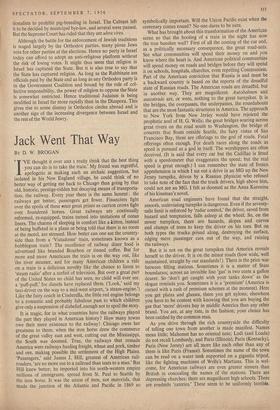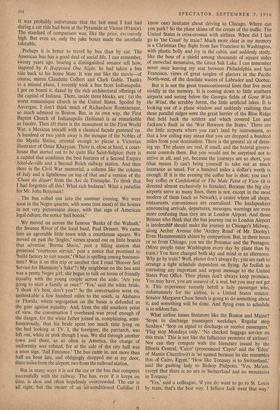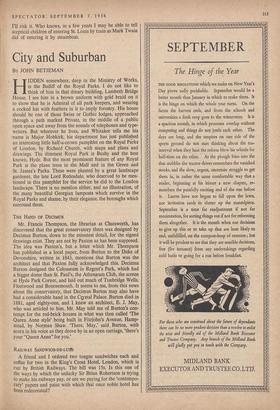Jack Went That Way BY D. W. BROGAN 'VE thought
it over and I really think that the best thing
I
you can do is to take the train.' My friend was regretful, apologetic at making such an archaic suggestion, but isolated in his New England village, he could think of no better way of getting me back to Chicago than going by that old, historic, prestige-ridden but decaying means of transporta- tion, the railway. Every year there is the same lament : the railways get better; passengers get fewer. Financiers fight over the spoils of these once great prizes as carrion crows fight over foundered horses. Great railways are continually reformed, re-equipped, trains turned into imitations of ocean liners. The charms of sleeping in comfort like a kitten, instead of being buffeted in'a plane or being told that there is no room at the motel, are stressed. How better can one see the country- side than from a `Vistadome' train, sometimes known as a bubblegum train? The excellence of railway diner food is advertised like branded Bourbon or tinned coffee. But for more and more Americans the train is on the way out, like the river steamer, and for many American children a ride on a train is a delicious novelty like the chance to listen to `steam radio' after a surfeit of television. But over a great part of the United States no child has seen, no child will ever see, a `puff-puff,' for diesels have replaced them. (`Look,' said my taxi-driver on the way to a mid-west airport, `a steam-engine.') Like the fairy coach in Cinderella, the little red engine belongs to a romantic and probably fabulous past to which children give only a suspension of disbelief, enough not to spoil the story.
It is tragic, for in what countries have the railways played the part they played in American history? How many towns owe their mere existence to the railway! Chicago owes her greatness to them; when the iron horse drew the commerce of the great valley east and west, cutting out the Mississippi, the South was doomed. True, the railways that remade America were railways hauling freight, wheat and pork, timber and ore, making possible the settlement of the High Plains. `Passengers,' said James J. Hill, greatest of American rail- roaders, 'are no more use to a railroad than teats to a man.' But Hill knew better; he imported into his north-western empire millions of immigrants, spread from St. Paul to Seattle by the iron horse. It was the union of men, not materials, that made the junction of the Atlantic and Pacific in 1869 so symbolically important. Will the Union Pacific exist when the centenary comes round? No one dares to be sure.
What has brought about this transformation of the American scene so that the hooting of a train in the night has now the true banshee wail? First of all the coming of the car and, as a politically necessary consequence, the great road-nets. See what communities will spend their money on and you know where the heart is. And American political communities will spend money on roads and bridges before they will spend it on schools, hospitals, churches, even repelling Communism.
Part of the American conviction that Russia is and must be a backward country is based on the reports of the dreadful state of Russian roads. The American roads are dreadful, but in another way. They are magnificent. Autobahnen and autostrade are, or were, nothing to the great turnpikes. It is the bridges, the overpasses, the underpasses, the roundabouts that are the most fantastic structures in America. The approach to New York from New Jergey would have rejoiced the prophetic soul of H. G. Wells; the great bridges soaring across great rivers on the road south to Washington, the bridge of concrete that floats outside Seattle, the fairy vistas of San Francisco Bay, these are offerings to the god of roads. Fatal offerings often enough. For death races along the roads as speed is pursued as a god in itself. The worshippers are often deceived. (It is said that every car but the Cadillac is fitted with a speedometer that exaggerates the speed; but the real speed is great enough.) I can remember the state of frozen apprehension in which I sat out a drive in an MG up the New Jersey turnpike, driven by a Russian physicist who refused to take note of the fact that the truck drivers, high above him, could not see an MG. I felt as doomed as the Anna Karenina of his kinsman's novel.
American road engineers have found that the straight, smooth, undeviating turnpike is dangerous. Even if the seventy- mile limit is enforced by 'radar control,' the driver, saved from hazard and temptation, falls asleep at the wheel. So, on the newer turnpikes, there are hazards, slopes and curves and clumps of trees to keep the driver on his toes. But on both types the trucks, pound along, destroying the surface, edging mere passenger cars out of the way, and ruining the railways.
But it is not on the great turnpikes that America reveals herself to the driver. It is on the minor roads (how wide, well maintained, straight by our standards !). There is the price war between filling stations. Sometimes it is a matter of State boundaries; across an invisible line 'gas' is two cents a gallon dearer. So i`don't get caught with your tanks down' as the slogan remihds you. Sometimes it is a 'premium' (America is cursed with a rash of premium schemes at the moment). Here you get plates and glasses, there you get nylons; elsewhere you have to be content with knowing that you are buying the gas that 'more' drivers buy in middle America than any other brand. You are, at any rate, in the fashion; your choice has been ratified by the common man.
As you drive through the rich countryside the difficulty of telling one town from another is made manifest. Names mean little; Mahomet has no oriental note; Lodi (and Loada) do not recall Lombardy, and Paris (Illinois), Paris (Kentucky), Paris (New Jersey) are all more like each other than any of them is like Paris (France). Sometimes the name of the town can be read on a water tank supported on a gigantic tripod, like the fighting machines of Wells's Martians. This is wel- come, for American railways are even greater sinners than British in concealing the names of the stations. There are depressing churches; there are magnificent high schools. There are roadside 'eateries.' These seem to be uniformly terrible. It was probably unfortunate that the lait meal I had had during a car ride had been at the Pyramide at Vienne (France). The standard of comparison was, like the price, excessively high. But even so, ,only the juke boxes made the interlude tolerable.
Perhaps it is better to travel by bus than by car. The American bus has a good deal of social life. I can remember. twenty years ago, hearing a distinguished senator tell how, inspired by It Happened One Night, he had taken a bus ride back to his home State. It was just like the movie—of course, minus Claudette Colbert and Clark Gable. Thanks to a missed plane, I recently took a bus from Indianapolis. I got on board it, dazed by the rich architectural offerings of the capital of Indiana. There, inside three blocks, are: (a) the worst romanesque church in the United States. Spoiled by Auvergne, I don't think much of Richardson Romanesque, so much admired in Boston. But, in its own way, the First Baptist Church of Indianapolis (Indiana) is as remarkable as lssoire. Then (b) there is the monument to the First World War, a Mexican teocalli with a classical façade gummed on. A hundred or two yards away is the mosque of the Nobles of the Mystic Shrine, oriental enough to please a Victorian illustrator of Omar Khayyam. There is, close at hand, a court- house that started out to be quite like Saint-Sulpice; there is a capitol that combines the best features of a Second Empire hotel-de-ville and a Second Reich railway station. And then there is the Civil War memorial, a column like the column of July and a lighthouse on top of that and a version of the 'Chant du depart' from the Arc de Triomphe. To think that I had forgotten all this! What rich badness! What a paradise for Mr. John Betjeman !
The bus rolled out into the summer evening. We were soon in the Negro quarter, with some (not most) of the houses in not very picturesque decay, with that sign of American legal culture, the notice 'bail bonds.'
We moved on across the famous 'Banks of the Wabash,' the Swanee River of the local bard, Paul Dresser. We came into an agreeable little town with a courthouse square. We moved on past the 'jingles,' verses spaced out on little boards that advertise `Burma Shave,' past a filling station that promised 'courteous service,' past a notice that promised to `build factory to suit tenent.' (What is spelling among business- men? Was it on this trip or another that 1 read 'Hoover Soil Service for Humanity's Sake'?) My neighbour on the bus seat was a pretty Negro girl; she began to talk on terms of friendly equality with the young couple across the aisle. 'Are you going to start a family at once?' Yes,' said the white bride, think it's best, don't you?' So the conversation went on, unthinkable a few hundred miles to the south, in Alabama or Florida. where segregation on the buses is defended as the gate against equality. And, from the old southern point of view, the conversation I overheard was proof enough of the danger, for the white father joined in, complaining, semi- humorously, that his bride spent too much time lying on the bed looking at TV. I, the foreigner, the patriarch, was left out, white or pink though I was. We slid through another town and there, as so often in America, the charge of uniformity was refuted, for at the side of the city hall was a neon sign, 'Jail Entrance.' The bus came in, not more than half an hour late, and obligingly dropped me at my door, three miles from the airport, two from the railroad station.
But in many ways it is not the car or the bus that competes successfully with the railway. The bus, even if it keeps on time, is sloW and often hopelessly overcrowded. The car is all right, but the owner of an air-conditioned Cadillac (I know one) hesitates about driving to Chicago. Where can you park? So the plane skims off the cream of the traffic.'The United States is criss-crossed with airlines. When did I last go to 'the Coast' by train? Much more clear in my memory is a Christmas Day flight from San Francisco to Washington, with plastic holly and ivy in the cabin, and suddenly steely, like the boss of a shield among thousands of square miles of snowclad mountains, the Great Salt Lake. I can remember never once leaving my seat between Philadelphia and San Francisco, views of great tangles of glaciers in the Pacific North-west, of the desolate wastes of Labrador and Quebec.
But it is not the great transcontinental lines that live most vividly in the memory. It is coming down to little southern airports and seeing below the Georgia fields of Gone With the Wind, the scrubby forest, the little artificial lakes. It is looking out of a plane window and suddenly realising that these parallel ridges were the great barrier of the Blue Ridge that held back the settlers and which covered Lee and Jackson's flank in the War Between the States.' There arc the little airports where you can't land by instruments, so that a low ceiling may mean that you are dropped a hundred miles from your destination. There. is the general air of dress- ing up. The planes are real, if small, and the federal govern- ment controls them. But you would not be surprised not to arrive at all, and yet, because the Journeys are so short, 'you (that means I) can't bring yourself to take out as much insurance as usual. For a hundred miles a dollar's worth is enough. If it is the evening the coffee bar is shut; you can't buy coffee or Confidential or The Male Point of View (it is directed almost exclusively to females). Because the big city airports serve so many lines, there is not, except in the most modern of them (such as Newark), a centre where all shops, restaurants, conveniences are centralised. The loudspeakers announcing arrivals, departures, messages, warnings are even more confusing than they are at London Airport. And those Britons who think that the bus journey out to London Airport is intolerable should make the journey to Chicago's Midway, along Archer Avenue (the 'Archey Road' of Mr. Dooley). Even Hammersmith shines by comparison. But, in three hours or so from Chicago, you see the Potomac and the Pentagon. (More people enter Washington every day by plane than by train.) You have changed both sky and mind in an afternoon. Why go by train? Well, planes don't always fly; you are rash to arrange a tight schedule dependent on flying. As foolish as entrusting any important and urgent message to the United States Post Office. Then planes don't always keep promises. You may have, you are assured of, a seat, but you may not get it. This experience recently befell a lady passenger who. unfortunately for the airline, is a United States senator. Senator Margaret Chase Smith is going to do something about it, and something will be done. And flying even to schedule is so seldom fun.
What airline issues literature like the Boston and Maine? `Stops to discharge passengers weekdays. Regular stop Sundays.' Stop on signal to discharge or receive passengers.' `Flag stop Mondays only.' No checked baggage service on this train.' This is not like the fallacious promises of airlines! Nor can they compete with the literature issued by the Illinois Central. 'Cairo' (pronounced `Cayro' and the 'Eden' of Martin Chuzzlewit) is `so named because its site resembles that of Cairo, Egypt."How like Torquay is to Switzerland,' said the gushing lady to Bishop Philpotts. 'Yes, Ma'am. except that there is no' sea in Switzerland and no mountains in Torquay.' I'll risk it. Who knows, in a few years I may be able to tell sceptical children of entering St. Louis by train as Mark Twain did of entering it by steamboat.




































 Previous page
Previous page